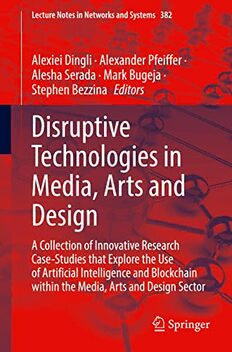
Disruptive Technologies in Media, Arts and Design PDF
Preview Disruptive Technologies in Media, Arts and Design
Lecture Notes in Networks and Systems 382 Alexiei Dingli · Alexander Pfeiffer · Alesha Serada · Mark Bugeja · Stephen Bezzina Editors Disruptive Technologies in Media, Arts and Design A Collection of Innovative Research Case-Studies that Explore the Use of Artificial Intelligence and Blockchain within the Media, Arts and Design Sector Lecture Notes in Networks and Systems Volume 382 SeriesEditor JanuszKacprzyk,SystemsResearchInstitute,PolishAcademyofSciences, Warsaw,Poland AdvisoryEditors FernandoGomide,DepartmentofComputerEngineeringandAutomation—DCA, SchoolofElectricalandComputerEngineering—FEEC,UniversityofCampinas— UNICAMP,SãoPaulo,Brazil OkyayKaynak,DepartmentofElectricalandElectronicEngineering, BogaziciUniversity,Istanbul,Turkey DerongLiu,DepartmentofElectricalandComputerEngineering,University ofIllinoisatChicago,Chicago,USA InstituteofAutomation,ChineseAcademyofSciences,Beijing,China WitoldPedrycz,DepartmentofElectricalandComputerEngineering,Universityof Alberta,Alberta,Canada SystemsResearchInstitute,PolishAcademyofSciences,Warsaw,Poland MariosM.Polycarpou,DepartmentofElectricalandComputerEngineering, KIOSResearchCenterforIntelligentSystemsandNetworks,UniversityofCyprus, Nicosia,Cyprus ImreJ.Rudas,ÓbudaUniversity,Budapest,Hungary JunWang,DepartmentofComputerScience,CityUniversityofHongKong, Kowloon,HongKong The series “Lecture Notes in Networks and Systems” publishes the latest developmentsinNetworksandSystems—quickly,informallyandwithhighquality. Originalresearchreportedinproceedingsandpost-proceedingsrepresentsthecore ofLNNS. VolumespublishedinLNNSembraceallaspectsandsubfieldsof,aswellasnew challengesin,NetworksandSystems. The series contains proceedings and edited volumes in systems and networks, spanning the areas of Cyber-Physical Systems, Autonomous Systems, Sensor Networks, Control Systems, Energy Systems, Automotive Systems, Biological Systems, Vehicular Networking and Connected Vehicles, Aerospace Systems, Automation, Manufacturing, Smart Grids, Nonlinear Systems, Power Systems, Robotics,SocialSystems,EconomicSystemsandother.Ofparticularvaluetoboth the contributors and the readership are the short publication timeframe and the world-wide distribution and exposure which enable both a wide and rapid disseminationofresearchoutput. Theseriescoversthetheory,applications,andperspectivesonthestateoftheart andfuturedevelopmentsrelevanttosystemsandnetworks,decisionmaking,control, complexprocessesandrelatedareas,asembeddedinthefieldsofinterdisciplinary andappliedsciences,engineering,computerscience,physics,economics,social,and lifesciences,aswellastheparadigmsandmethodologiesbehindthem. IndexedbySCOPUS,INSPEC,WTIFrankfurteG,zbMATH,SCImago. AllbookspublishedintheseriesaresubmittedforconsiderationinWebofScience. ForproposalsfromAsiapleasecontactAnindaBose([email protected]). Moreinformationaboutthisseriesathttps://link.springer.com/bookseries/15179 · · Alexiei Dingli Alexander Pfeiffer · · Alesha Serada Mark Bugeja Stephen Bezzina Editors Disruptive Technologies in Media, Arts and Design A Collection of Innovative Research Case-Studies that Explore the Use of Artificial Intelligence and Blockchain within the Media, Arts and Design Sector Editors AlexieiDingli AlexanderPfeiffer DepartmentofArtificialIntelligence EmergentTechnologiesLab FacultyofICT Danube-UniversityKrems UniversityofMalta Vienna,Austria Msida,Malta MarkBugeja AleshaSerada DepartmentofArtificialIntelligence SchoolofMarketingandCommunication InstituteofClimateChangeandSustainable UniversityofVaasa Development Vaasa,Finland UniversityofMalta Msida,Malta StephenBezzina DepartmentofArtificialIntelligence FacultyofICT UniversityofMalta Msida,Malta ISSN2367-3370 ISSN2367-3389 (electronic) LectureNotesinNetworksandSystems ISBN978-3-030-93779-9 ISBN978-3-030-93780-5 (eBook) https://doi.org/10.1007/978-3-030-93780-5 ©TheEditor(s)(ifapplicable)andTheAuthor(s),underexclusivelicensetoSpringerNature SwitzerlandAG2022 Thisworkissubjecttocopyright.AllrightsaresolelyandexclusivelylicensedbythePublisher,whether thewholeorpartofthematerialisconcerned,specificallytherightsoftranslation,reprinting,reuse ofillustrations,recitation,broadcasting,reproductiononmicrofilmsorinanyotherphysicalway,and transmissionorinformationstorageandretrieval,electronicadaptation,computersoftware,orbysimilar ordissimilarmethodologynowknownorhereafterdeveloped. Theuseofgeneraldescriptivenames,registerednames,trademarks,servicemarks,etc.inthispublication doesnotimply,evenintheabsenceofaspecificstatement,thatsuchnamesareexemptfromtherelevant protectivelawsandregulationsandthereforefreeforgeneraluse. Thepublisher,theauthorsandtheeditorsaresafetoassumethattheadviceandinformationinthisbook arebelievedtobetrueandaccurateatthedateofpublication.Neitherthepublishernortheauthorsor theeditorsgiveawarranty,expressedorimplied,withrespecttothematerialcontainedhereinorforany errorsoromissionsthatmayhavebeenmade.Thepublisherremainsneutralwithregardtojurisdictional claimsinpublishedmapsandinstitutionalaffiliations. ThisSpringerimprintispublishedbytheregisteredcompanySpringerNatureSwitzerlandAG Theregisteredcompanyaddressis:Gewerbestrasse11,6330Cham,Switzerland Preface Disruptionofthealreadyestablishedpatternsanddesignshasbeenthemajorcreative impulsebehindmanytechnologicalbreakthroughstoday.Thisanthologyintroduces aselectednumberofthelatestartificialintelligenceandblockchainusecasesapplied tothemedia,artsanddesignsector.Theinspirationbehindthisbookoriginatedfrom theannualMedia,ArtsandDesignConferencethatstartedbackin2019,bringing together the transcontinental community of researchers, educators and engineers. Growing from this cooperation, the contents of this book draw from the MAD Blockchain2020andMADArtificialIntelligence2020conferencesthatcontinued to gather industry and academic professionals from a broad spectrum of creative andscientificfieldsofstudy.Theworkthattheypresentedexploredblockchainand artificialintelligenceinthecontextofdigitalgames. This publication is divided into two parts that cover two aforementioned major fieldsofinnovation.Initially,severalblockchainitemsarepresented,followedbya showcaseofAIusecasesandresearch.Part1highlightsuniqueaspectsofblockchain technologyanddiscussescasestudiesthatunderlinehowblockchaintechnologycan beusedingames,educationandsocietyingeneral.JoshuaEllulandGordonJ.Pace combine the capabilities of blockchain and the classical design of Nomic game to generateinsightsaboutself-regulatingorganizationsofplayers.DanielKrafttackles thechallengeofblockchainscalabilitybydecouplingthegamestatefromthecore network.AcollaborationbetweenseveralAustrianuniversitiesandcompanies,repre- sentedbyThomasWernbacherandhiscolleagues,presentstheresultsofdeveloping andtestingablockchain-basedapplicationthatgamifiesreportingonwasteheatin thecity.AndreThomasandAlexanderPfeifferpresenttheprototypeoftheireduca- tionalgameonblockchainthatenhanceslearningexperienceinthehistoryofarts. J. Tuomas Harviainen, Alesha Serada and Tanja Sihvonen collaborate to present themultidimensionalpictureofblockchaintechnologiesincommercialgamesand virtual worlds. Zooming into particular design challenges of such games, Alesha Serada evaluates blockchain technologies as the basis for fairness in play. Finally, Tanja Sihvonen, Merja Koskela and Liisa Kääntä describe the results of linguistic analysisperformedonthetopicsofblockchainandartificialintelligenceinFinnish journalistictexts. v vi Preface Artificial intelligence has gained a lot of prominence in the last decade, and it would be very unlikely to meet someone who has not heard of it. The scalability withwhichartificialintelligencehasgrownisattributedtodecadesofpreviouswork pushedbymachinelearningpioneerssuchasGeofferyHinton,YoshuaBengioand YannLecun,whoseworkhasbeenactualizedthroughhardwareimprovements.The state of the area today has led to all major industries, including the digital games sector investing heavily into the use of artificial intelligence applied to different facetsoftheindustry,fromautomatinggamedevelopmentprocessestodeveloping autonomous agents that are able to challenge human players better. This part of this anthology presents a number of technical works, such as the work presented by Siracuse et al. and Sammut Bonnici et al., that illustrate the use of generative adversarial networks and reinforcement learning, respectively. Neundlinger et al. alsopresenttheirinterestingwork thatcombines virtualrealityand artificialintel- ligence to understand the limitations of conversational artificial intelligence and provideinsightsonhowtodesignimmersiveVRtrainingforsocialskills.Thispart also includes work that delves into ethical issues, an area of research increasingly becomingmorepopularastheuseofartificialintelligenceaswellasthejustification ofhowitcomestocertainconclusionsisbeingquestionedfurther.Thispartincludes the work presented by Adnan that explores how AI can be encompassed through a legal framework to protect citizens from misuse and how the ethics of care can be applied to AI. Another viewpoint on ethics and AI is also presented by Giulia Taurino that attempts to present an approach to shape AI practice and understand howinformationfilteringsystemstransformmediacultures.Finally,AlexanderK. SeewaldpresentsworkexploringthefutureofAIandhowfurtherdevelopmentin thisareawilltakeustowardartificialgeneralintelligence. This volume is a collection of recent research that was made possible through thecollaborationofmultipleresearchersandacademicsintheindustry.Theeditors wouldliketotaketheopportunitytothankalltheparticipantsthatattendedtheconfer- ence and contributed to the book proceedings. Special gratitude goes to Nicholas JushchyshynandMichaelWagnerfromDrexelUniversity,Philadelphia,ScotOster- weil from the MIT Education Arcade, Natalie Denk from Danube University, for theirongoingsupportwiththeconferencesandtheanthology. Msida,Malta MarkBugeja Contents Blockchain SoliNomic:ASelf-modifyingSmartContractGameExploring ReflexivityinLaw ................................................. 3 JoshuaEllulandGordonJ.Pace HotCity—AGamifiedTokenSystemforReportingWasteHeat Sources ........................................................... 15 ThomasWernbacher, AlexanderPfeiffer, ErnstGebetsroither-Geringer, MarkoGoels, JakobWorster, ErnstMeißner,AngelikaGraf,RomanaStollnberger,RomanGeyer, Ralf-RomanSchmidt,andAleshaSerada “BlockchainMayAutomateJobsDonebytheBossandAICan PredictaHeartAttack” ............................................ 29 TanjaSihvonen,MerjaKoskela,andLiisaKääntä Gallery Defender: Integration of Blockchain Technologies intoaSeriousGameforAssessment:AGuidelineforFurther Developments ..................................................... 43 AndréThomasandAlexanderPfeiffer CryptogamesasDriversforBlockchainApplicationDevelopment ...... 55 J.TuomasHarviainen,AleshaSerada,andTanjaSihvonen Fairness by Design: The Fair Game and the Fair Price onaBlockchain-BasedMarketplace ................................. 63 AleshaSerada HorizontalScalabilityofBlockchainGamesUsingtheGSPModel ..... 77 DanielKraft vii viii Contents AI ACriticismoftheTechnologicalSingularity ......................... 91 AlexanderK.Seewald Algorithms,EthicsandJustice ...................................... 121 AdnanHadzi Training Social Skills in Virtual Reality Machine Learning asaProcessofCo-Creation ......................................... 139 KlausNeundlinger, MichaelMühlegger, SimoneKriglstein, ThomasLayer-Wagner,andGeorgRegal TheBrokennessinOurRecommendationSystems:Computational ArtforanEthicalUseofA.I. ....................................... 157 GiuliaTaurino Exploring Reinforcement Learning: A Case Study Applied tothePopularSnakeGame ......................................... 169 RussellSammutBonnici,ChantelleSaliba,GiuliaElenaCaligari, andMarkBugeja An Approach Towards Architecture-Independent Output for Generative Networks: Texturing Aerial Town Maps forRoleplayingGames ............................................. 193 GianfrancoSiracusa,DylanSeychell,andMarkBugeja AuthorIndex ...................................................... 221 Blockchain
